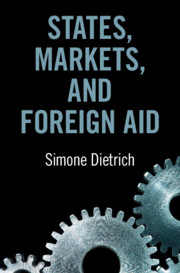Book contents
- States, Markets, and Foreign Aid
- States, Markets, and Foreign Aid
- Copyright page
- Dedication
- Contents
- Figures
- Tables
- Preface and Acknowledgements
- 1 Understanding Donor Pursuit of Foreign Aid Effectiveness
- 2 How National Structures Shape Foreign Aid Delivery
- 3 Examining the Causal Mechanism across Donors
- 4 Country-Level Evidence Linking Donor Political Economies to Variation in Aid Delivery
- 5 Testing the Argument with Evidence from Aid Officials from the United States, United Kingdom, Sweden, Germany, France, and Japan
- 6 Examining Public Opinion as an Alternative Explanation
- 7 Implications for Aid Effectiveness, Public Policy, and Future Research
- Bibliography
- Index
7 - Implications for Aid Effectiveness, Public Policy, and Future Research
Published online by Cambridge University Press: 29 October 2021
- States, Markets, and Foreign Aid
- States, Markets, and Foreign Aid
- Copyright page
- Dedication
- Contents
- Figures
- Tables
- Preface and Acknowledgements
- 1 Understanding Donor Pursuit of Foreign Aid Effectiveness
- 2 How National Structures Shape Foreign Aid Delivery
- 3 Examining the Causal Mechanism across Donors
- 4 Country-Level Evidence Linking Donor Political Economies to Variation in Aid Delivery
- 5 Testing the Argument with Evidence from Aid Officials from the United States, United Kingdom, Sweden, Germany, France, and Japan
- 6 Examining Public Opinion as an Alternative Explanation
- 7 Implications for Aid Effectiveness, Public Policy, and Future Research
- Bibliography
- Index
Summary
Chapter 7 considers the implications of the book's analysis for the study of foreign aid effectiveness as well as policy-making. It establishes a link between political economies and the different kinds of outcomes that donor officials prioritize. Donor governments that outsource aid delivery in countries with bad governance may achieve greater success in providing immediate relief to the poor through easily implementable health interventions than donor governments that continue to engage in institution building in collaboration with the state. However, outsourcing in foreign aid delivery might hamper or even undermine donor efforts to build up a state capable of managing its own development – an objective that ranks high for donor governments who prefer a tactic of greater engagement with the government in the developing country. The book further suggests that the proliferation of neoliberal governance beliefs puts increasing pressure on statist regimes to change their metric, a process, which may come at the expense of efforts to strengthen the capacity of the state abroad. Finally, my book opens up future avenues for research.
Keywords
- Type
- Chapter
- Information
- States, Markets, and Foreign Aid , pp. 222 - 237Publisher: Cambridge University PressPrint publication year: 2021

